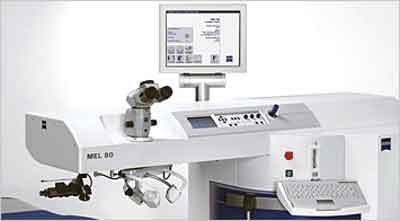In the study, surgeons at 10 centers performed cataract surgery on 160 cataract patients who were taking Flomax. To compensate for the effects of the drug on the iris dilator muscle, the surgeons were allowed to use modified techniques as they saw fit. The following three techniques emerged from the study as being the most helpful.
"From a pharmacologic viewpoint, we know that one of our problems intraoperatively is progressive miosis, that is, the pupil sphincter muscle is unopposed because the dilator is weakened," explains Los Angeles surgeon Samuel Masket, who took part in the study. "And the traditional dilating agents are not strong enough to totally weaken the constrictor muscle of the pupil. Atropine is the most effective agent we have, but it has to be started several days in advance of surgery. The problem is, if we don't know prior to surgery that the patient has taken an alpha blocker, we can't start atropine before surgery." The appropriate regimen is atropine t.i.d. for two days before surgery. Dr. Masket notes, however, that following this regimen increases the risk for urinary retention if the patient stops taking Flomax, so patients should be encouraged to keep taking their alpha blocker.
In addition, the surgeons found that stimulating the weakened dilator muscle with concentrated mydriatics during the surgery itself was beneficial. Joel Shugar, MD, in Jupiter, Fla., advocates using epinephrine injected beneath the iris.
"From my viewpoint, using atropine prior to surgery and intraocular epinephrine at the time of surgery has enabled 19 out of 20 cases to be performed as routine surgeries," says Dr. Masket. "The one outlier was a patient whose pupil was so small prior to surgery that he required one of the other strategies, such as iris hooks."
In addition to the pharmacologic strategy, the study also found mechanical aids, such as iris hooks or pupil dilating rings, to be effective. The third aid that proved helpful in the study was the use of a viscoelastic agent to expand the pupil and keep it away from the incision. Dr. Masket says either Healon 5 (AMO) or DisCoVisc (Alcon) works particularly well for this.
"These concepts are complementary rather than competitive," says Dr. Masket. "So, we can initiate a pharmacologic approach. If that isn't adequate, we can then consider the second approach, which would be either mechanical devices to expand the pupil or heavy visco agents and reduced fluidics. Each one just builds on the one before it depending on how much help we need intraoperatively."
To realize the benefits during surgery, however, surgeons say the doctor's knowledge about alpha-1 blocker use is critical.
"Patients who haven't taken Flomax as long as five years before the surgery and who are no longer taking it can suffer floppy iris syndrome," said the study organizer David Chang, MD, in a conference call on both the study and dealing with the effects of alpha-1 blockers.
Lawrence Ross, MD, president of the American Urological Association, also participated in the telephone discussion. He noted that physicians should be aware that it's not necessarily just the male patients who can be on alpha blockers. "Alpha blockers are also given for other urinary tract symptoms," he said. "So some women may be on these drugs too. Therefore, it's important to recognize the class of drugs when taking a history of a patient, and not just looking for prostate patients who take it." Other alpha-1 blockers to watch for include terazosin (Hytrin), doxazosin (Cardura) and alfuzosin (Uroxatral).
The full results of the study will be presented at November's meeting of the American Academy of Ophthalmology.
|
FDA Clearance for MEL 80 Excimer Laser System
The Food and Drug Administration last month cleared Carl Zeiss Meditec's MEL 80 excimer laser system for refractive surgery in the United States. The company has more than 750 excimer systems already delivered to customers internationally.
Results from clinical studies found that 93 percent of patients were corrected at three months to 20/20 or better visual acuity, and 41 percent were corrected to 20/12.5 or better at six months. Results also showed that 85 percent of patients achieved within 0.5 D of the intended correction at three months postoperative follow up. The MEL 80 laser uses a small spot size and Gaussian beam profile. The ablation process is also very fast, so there is less dehydration of the eye. The thermally optimized distribution of the laser firing pattern also protects the stroma, despite the system's high ablation speed, the company says. Since the patient only needs to concentrate on the fixation light for a few seconds, patient stress is reduced.

"The MEL 80 has superior characteristics that make it extremely advanced," said Mark Packer, MD, clinical associate professor at Oregon Health and Science University, Portland, Ore., and a principal investigator of the clinical trial. "Because of its speed, the amount of time the cornea is exposed is reduced and the overall treatment procedure is significantly shortened. Additionally, the laser is able to preserve the natural curvature of the cornea ultimately improving the quality of vision." Preparations for commercial launch of the MEL 80 in the United States are now being finalized.
"We believe that the excellent results from the FDA clinical studies will further improve the reputation of the MEL 80 as one of the leading refractive laser systems," said Jim Taylor, president and CEO of Carl Zeiss Meditec. "In addition to the advanced excimer laser platform offered by our MEL 80, we have also pursued the development of an advanced femtosecond laser system for flap creation. The ongoing clinical testing of these femtosecond technologies has been both more rapid and more promising than we had anticipated, and a 510k has recently been filed. As a result, our intent is to bring a truly unique and comprehensive offering to our customers."
Intestinal Surgery Tied to Late Vision Decrease
A study at Baylor College of Medicine's Cullen Eye Institute suggests that vitamin A deficiency should be suspected in patients with unexplained decreased vision and a history of intestinal surgery, regardless of the timing of the surgical procedure. Three patients in the retrospective review developed decreased vision from vitamin A deficiency more than 18 years after their intestinal surgery, according to the study in the British Journal of Ophthalmology.
Vitamin A deficiency, often presenting with nyctalopia, has been described in a number of patients with malabsorption as a result of intestinal bypass surgery and, more recently, bariatric surgery. In these reports vitamin A deficiency developed within several years of gastric or intestinal surgery.
|




